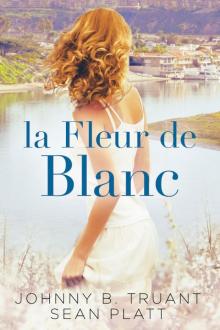- Home
- Sean Platt
La Fleur de Blanc Page 7
La Fleur de Blanc Read online
Page 7
Lily stammered. “I suppose I’d need to see the space.”
Marcello nodded. “Of course. But not at this moment. So in general, what would you most like around you as you dined? Currently we have mostly art, a few flowers only.”
“You didn’t come to the florists that were here before?”
“Flowers have usually seemed rather ordinary to me. Our art … well, eventually you will see. And Amadeo, he does not normally like plants of any sort in the dining room.”
“Why?”
“Because they die.”
“Not for weeks.”
“But they die,” Marcello insisted. “My wife, his mother? It was a long battle that neither of us cares to remember. When she was in the hospital, she was given many flowers. She loved them, but of course their leaves and petals always shriveled and fell. She would never allow the nurses to take them until they were mostly gone. Every day Amadeo and I looked at them, watching them wither. Soon new ones would arrive, and Maria would say over and over that they were molata bella. And then we would watch them die, too.”
Lily wasn’t sure how to reply. She’d known this man for under ten minutes, and he’d already told her a story she’d only have shared with close friends and family. But somehow the story didn’t make her feel burdened or awkward. Marcello struck her as a passionate man whose feelings rarely fell below the surface — it was in the way he looked around a room, the way his fingers lingered on objects, the way he spoke. She felt a sense of trust, of wanting to trust in return. Not always an easy thing for Lily Whistler, as bright and sunny as she always tried to be.
“I’m sorry.”
“It was a long time ago. But the impression remains. Many times I suggested flowers for the restaurant, but it wasn’t until you moved in that I managed to convince Amadeo that the idea might be worth visiting.”
In Lily’s mind, she saw the broad-shouldered man with the dark, mysterious brow and the contrastingly steely blue eyes as he’d stood beside his father, outside Bella by the Sea, looking toward La Fleur during her week of cleanup and talking. Had they been discussing her after all?
“Me?”
“The shops before, they sold only flowers. You sell romance.”
There was that word again. Marcello was surely more than twice her age, and yet she felt herself blushing. Lily felt like a small child in front of a beautiful stranger, trying to hide behind her mother’s legs.
Without waiting for her response, Marcello clapped and moved toward the cooler.
“So! You will have to tell me. Traditionally the flower we know for romance is the rose. But the color is usually red, so clearly we must not feel bound by tradition. Here is our arrangement: Each couple has a table on a semicovered patio, either fully in, fully out, or halfway depending on the weather and their preferences. We have taken great pains to balance privacy with the feeling of not being alone — people still like having others around, we’ve found, even when the evening’s goal is to be intimate with but one other. There are counters around the dining room interior, a reception area, which you may have seen on passing, and many flat surfaces, like bases for pillars, on the patio over the ocean. What should I fill my dining room with, Lily Whistler? And where shall I place my flowers?”
Lily thought for a moment. She’d advised Dean Moreno to buy the most expensive bouquet she could imagine, but part of that had been an odd mix of greed and spite — if Dean’s attitude toward his lady for the evening was that crass, Lily, who could easily see herself in similar shoes, wanted to make Dean pay for what he hoped to receive. But she wouldn’t do that with Marcello. She could advise fresh blooms every night, and filling Bella’s every corner with them, but she believed a modest approach would be better — less being more, to a point — and found herself selling her newest recurring order short by explaining exactly what she had in mind.
“I think you should have a bowl of roses on the table where your guests enter, and another bowl for each table. You should have phalaenopsis orchids outside on the patio — they live a long time so you won’t have to replace them often — small bowls with floating gardenias in the bathroom — a small bowl with one for the guys, and a larger bowl with three for the girls — rose petals to accompany dessert, and a fresh boutonniere for your servers each evening. I can make new ones whenever you need them.” Lily ran her words together as if she could barely believe them. She added, “Of course, I’ve not really seen the place, but those are my first thoughts.”
Lily looked down, then quickly back up to meet Marcello’s eyes and widening smile.
“And how often should we get new bowls of roses?”
“Normally I’d say once a week is fine, but you probably want every few days. Your diners will want them to look perfect. And the gardenias will need to be changed out every two days, too. They smell stronger as they age, but they also yellow fast.”
Lily felt bold, and bold felt great.
“Perfecto.” Marcello nodded. “May I take some now?”
“I haven’t given you a price.”
Marcello smiled indulgently. “Certo. Go ahead.”
Lily made some quick calculations and told him.
Marcello hadn’t broken his gaze or his smile. “Now you have told me. Please.” He set a credit card on the counter. It was the second black Amex she’d seen in two days, this one embossed with the name Bella by the Sea.
“Your order first,” she said, reaching for buckets. Marcello had his arms out, waiting for receipt. But the leaves would dust his fine suit, and the cut ends would drip and bleed on the expensive fabric.
“I have a cart,” she said.
“Then I will push it.”
“Let me.”
Marcello shook his head slowly. “We are in dinner preparation. Amadeo is very guarded about our trade secrets.” He laughed, making light of his son’s paranoia. “It was enough for him to agree to the flowers. He will not let you in.”
Lily hesitated. Marcello was refined and polite, but the idea that the younger Vitale would keep a florist out of the dining room — not even the kitchen — seemed silly. She reminded herself that she hadn’t exchanged a single word with him yet, and that she’d only projected what he might have been thinking. She reminded herself of the way she’d been so rudely turned away from Bella’s lobby, and that someone must have okay’d hiring the rude clerk who’d been so eager to send her off as unworthy.
“I can’t let you take them all alone.”
“I have your cart,” he said. But now that she thought about it, Lily hated her own suggestion. They wouldn’t take the huge display cart; they’d take the smaller one she’d found in the back. nouveau house hadn’t liked the eyesore of La Fleur’s first-day sign. Surely Kerry Barrett Kirby would turn her surgeon-shaped nose to the sky at fine restaurateurs crossing the courtyard like common shoppers at Walmart.
“Maybe the cart isn’t a good idea. It’ll … crush the petals.”
“I can carry them. Please.” Again Marcello held out his hands.
“There’s too many.”
“I can carry too,” came a voice. Lily turned to see Marcello’s son filling the doorway. He had to be six-four, built broad but not overly so, wearing fine and utterly immaculate chef’s whites, his features appearing darker than normal by comparison. His hair was carelessly swept back in a black, slightly shiny wave. And those eyes were on her — almost judgmental, as if he’d caught her doing something shameful.
“Ah,” said Marcello. He rattled off something in Italian — something that sounded almost chastising. “This is my son, Amadeo.”
“Matt,” the black-haired man corrected, casting an agitated glance at his father. He held out a large hand with none of his father’s delicacy. Lily took it, shook it, then let go.
“Lily.” She felt positively dwarfed by the man, but only part of the impression came from physical size. Lily had always been among the tallest in her class at five-eight, but Matt Vitale’s gaze added to his dominan
t presence, making him tower like a sentinel.
Lily felt most of the confidence she’d felt in Marcello’s presence — confidence that her shop’s concept was somehow noble rather than ridiculous, confidence in her own instincts about running it properly — drain away as Matt shuffled around gathering his father’s flowers. He seemed annoyed that Marcello had won what had the feel of a standing debate and burdened to have to be in the shop at all. Lily found herself equally intimidated and annoyed. If Matt had been the only one involved in the transaction, she might even have called him on it: Why did you order all of this if you’re just going to whine and bitch about it? But this wasn’t just Matt; this was Marcello. They were a team, and for better or worse she was now in business with Team Bella.
After they’d taken their order — and left Lily’s stock significantly lighter, her per-hour earnings bolstered — Marcello took her hand and (for real this time) kissed its back. Matt wasn’t in the store when he did it, and Lily was glad. It was a sweet, Old World gesture, and Matt’s presence would have ruined it. He’d probably watch with those judgmental blue eyes halfway up into his skull, sighing for his father to hurry along.
“Thank you,” Marcello said.
Lily was so flustered she didn’t think to thank him back. He was the customer. She’d benefited here; she’d just been pulled a few more inches back from what had so recently felt like crushing oblivion. He left before she could regroup, and merely sent her new regular off with an awkward smile.
Lily was just turning back into the store when she heard the clomping of thick-soled kitchen shoes. From behind her, a voice carrying no trace of the older man’s charm or accent said, “I’m supposed to get a lily.”
Lily turned. From Matt’s mouth, the statement had sounded somehow both insulting and possessive. Lily found herself reacting with delayed anger. He was supposed to get her? Fuck him!
“Excuse me?”
“He sent me back for a free lily.”
Matt pointed at the bucket of Casa Blancas. Lily followed his gaze. She supposed she could give him a free flower after all they’d ordered, and normally she’d be delighted to. But the way Matt was demanding it, as if entitled, was beyond annoying. Had she really watched him across the courtyard, feeling her heart flutter the way it once had for cute guys in high school? The thought was repugnant. It made her not want to respect herself, or her judgment. Wasn’t she stronger than some cocky California meathead? Didn’t she have more dignity than to fall for a handsome package without first checking to see what infuriating thing might be inside?
“Of course.” Lily reached for the bucket, grabbed one at random, and practically thrust it at his chest.
Matt shook his head. He pushed the flower back at her, his big hand on hers. Then he reached past her and picked up a stem that had been lying on the cart beside the bucket, not from within it. It was the lily that Marcello had chosen earlier and set aside. The one she’d insisted was his gift, to welcome him on her arrival to the Palms. The one she refused to let him pay for, even if he wanted to.
“Oh,” she said.
“He’s sentimental,” Matt explained.
“Sure.”
“It comes from being Italian.”
Lily couldn’t help herself. Knowing how it would probably sound, she said, “Aren’t you Italian?” She managed to resist adding the Italian version of his name to twist the knife: “Amadeo?”
For an uncomfortable second, Matt’s eyes were fixed on Lily’s. They were so, so incredibly blue. Like a sapphire. She wanted to challenge them, but there was no way she could. Given another second, she’d have looked away. But he spoke first, and broke the spell.
“See you in a couple of days,” he said, then turned, whites swishing to match his flower as he recrossed the courtyard.
Yes, Lily supposed she’d see them every week — until her flowers won the son, or until he claimed victory and the orders stopped altogether.
Lily hoped she wouldn’t be holding her breath in the meantime.
CHAPTER EIGHT
ANTONIA PECK
The following Monday, Lily paid rent for the first time. She’d had lofty dreams of stockpiling a cushion during her two-week grace period, but even without a bill she was barely above break-even. From here on out, replacing stock would cost less (because she’d need less) and would be counterbalanced with profit (because unless she overbought and had to trash dead and dying product, she’d be replacing what she’d sold). But there had been more startup expenses than anticipated (connection fees for the utilities, a cleaning service for the upholstery, hangings, decorations, and supplies), plus stocking the place from empty had been murder. She’d already been to Market twice, and even at her shop’s small size, bills to fill the buckets and cooler were crippling. She was starting more or less at zero. Better than starting negative, Lily supposed, but it meant she’d need to sink or swim. And — she tried to forget this — even break-even going forward meant she, herself, was working every day for free.
Her mood waxed and waned by the day. Most of the time she felt bright enough. The flowers helped; there was something about being surrounded by life that had always lifted Lily’s spirits. The warm sun helped too; she often sat on a bench outside the shop when no customers were inside, to soak in the sun and get some vitamin D. Len from the food cart helped; Silas from the art gallery helped; seeing Marcello (but not yet speaking to him again) helped; even Dusty’s innocently flirtatious presence when she went home exhausted helped. Shoppers were often elitist to the point of stirring her fury, but even the worst often bought enough to cover their annoyances. It seemed, most days, like a reasonable trade.
But there were other times — and this was strange, given Lily’s usually bulletproof optimism — when she felt thoroughly battered. Most of these times followed a procession of overly rude shoppers in a row, one after the other like a steady stream of water eroding a bank. Some bad times came from reports brought to Lily by Evelyn at the Palms leasing office, detailing other tenants who had petty problems with something La Fleur had been doing. Some came from her fellow tenants’ judgmental gazes, managing to make her feel unwelcome and unwanted in silence.
But mostly it came from the mere presence of Kerry Barrett Kirby.
Lily felt herself turning the idea of Kerry over and over like a coin in her hand. Everything about the woman (and to be fair, so much wasn’t Kerry’s fault) made Lily feel as if she was doing everything wrong. Kerry’s very appearance was the epitome of SoCal perfection, whereas Lily usually felt rushed, sweaty, and unkempt. If Kerry struggled through traffic, she never seemed harried, whereas Lily’s faux calm, in the mornings, often felt like a threadbare rug. Kerry was always immaculately dressed; her makeup was always in perfect order. She took breaks outside, sometimes pacing the complex like a lord looking for serfs. Lily, by contrast, took her breaks directly in front of the store because she had no staff, and couldn’t abandon her shop.
Lily cycled inside her head, alternately seeing Kerry as a foe and as someone who simply had achieved what Lily wanted but couldn’t yet have … if she ever would. She thought back to their only real encounter, remembering how crushed she’d felt afterward and how sure she’d been that she was about to fail spectacularly. But hadn’t Kerry been kind, really? Had she said anything — even the tidbits Lily felt like a blade in the gut — that wasn’t true? There had been four flower shops in her space. She did carry less variety than they had — and to Marcello Vitale, this was actually a fantastic point of distinction. Hadn’t Kerry said she admired Lily’s bravery? Hadn’t she wished her good luck? Maybe she’d imagined Kerry’s implied sleight, her not-so-subtle disapproval of the small, all-white flower shop. Maybe she’d merely concocted the dark fantasies that plagued her at night, wherein Kerry used her advanced tenure to pull the Palms strings and get the new girl ousted.
The following Wednesday Lily found herself gazing at her little coffee nook and feeling near the peak of her optimistic/pessimist
ic cycle after Bella had paid for its recurring order. She couldn’t afford a fancy espresso machine with a gold eagle on top, but maybe her chairs really were more worn than cozy. Maybe they were less comfortable and inviting than she’d thought. Kerry had offered (practically insisted) that she buy two nouveau house items at half price. She’d had a decent half week. It was far too early to start counting herself a success (survival was still a stretch), but half price was too good a deal to refuse. She could afford another small investment, couldn’t she? And she could ingratiate herself to the Palms grande dame at the same time, inviting a bit of nouveau house charm into La Fleur. Two or three birds with a single stone made total sense.
Knowing she was rationalizing, Lily locked the door and put a sign in the window during the usually slow midmorning, then crossed the courtyard, a maximum of $1,000 she couldn’t truly afford burning a hole in her pocket.
Lily returned ten minutes later realizing that at nouveau house, $1,000 could perhaps buy her a pewter ashtray. If she got it for half price, per Kerry’s generous discount.
Feeling like she was sliding down a slippery hill — as an impostor and failure — Lily passed La Fleur, leaving it closed and rounded the corner. It would have been melodramatic to sob in her palms, so instead she sat and stared across the courtyard, safely hidden in shadows where no one would see the girl who’d been foolish enough to dream … but who everyone knew could never afford a $5,000 natural shearling Fulham sofa and accompanying Reclaimed Russian Oak Parsons Coffee Table like a proper girl of lofty places.
“You look like you need a cinnamon roll,” said a voice.
Lily looked up to see the baker, Antonia, standing above her. She hadn’t realized, but she’d parked her sorry, feeling-bad-for-herself carcass in the corner by Buns. She’d been too blinded by self-pity to notice the scent, which was intoxicating now that it hit her.

 Jumper: Books 1-6: Complete Saga
Jumper: Books 1-6: Complete Saga WhiteSpace Season One (Episodes 1-6)
WhiteSpace Season One (Episodes 1-6) Tomorrow's Gone Season 1
Tomorrow's Gone Season 1 Yesterday's Gone: Episode 1
Yesterday's Gone: Episode 1 Yesterday's Gone: Seasons 1-6 Complete Saga
Yesterday's Gone: Seasons 1-6 Complete Saga The Beam- The Complete Series
The Beam- The Complete Series The Tomorrow Gene
The Tomorrow Gene Karma Police: Karma Police Book Two
Karma Police: Karma Police Book Two The Fall (Karma Police Book 5)
The Fall (Karma Police Book 5) The Beam: Season Three
The Beam: Season Three Resurrection
Resurrection No Escape (No Justice Book 2)
No Escape (No Justice Book 2) Deviant (Karma Police Book 4)
Deviant (Karma Police Book 4) The Tomorrow Clone (The Tomorrow Gene Book 3)
The Tomorrow Clone (The Tomorrow Gene Book 3) Unicorn Western
Unicorn Western Namaste
Namaste Alien Invasion (Book 2): Contact
Alien Invasion (Book 2): Contact Alien Invasion (Book 4): Annihilation
Alien Invasion (Book 4): Annihilation Dead City
Dead City The Eden Experiment
The Eden Experiment Unicorn Genesis (Unicorn Western)
Unicorn Genesis (Unicorn Western) The Beam: Season Two
The Beam: Season Two Yesterday's Gone: Season Six
Yesterday's Gone: Season Six Homecoming (Karma Police Book 6)
Homecoming (Karma Police Book 6)![[Alien Invasion 01.0] Invasion Read online](http://i1.bookreadfree.com/i1/03/30/alien_invasion_01_0_invasion_preview.jpg) [Alien Invasion 01.0] Invasion
[Alien Invasion 01.0] Invasion Z 2136 (Z 2134 Series Book 3)
Z 2136 (Z 2134 Series Book 3) Alien Invasion (Book 5): Judgment
Alien Invasion (Book 5): Judgment Threshold
Threshold Judgment
Judgment Jumper: Karma Police Book One
Jumper: Karma Police Book One Boricio Goes Camping (Dark Crossings)
Boricio Goes Camping (Dark Crossings) Extinction
Extinction Yesterday's Gone (Season Four): Episodes 19-24
Yesterday's Gone (Season Four): Episodes 19-24![[No Justice 01.0] No Justice Read online](http://i1.bookreadfree.com/i2/04/09/no_justice_01_0_no_justice_preview.jpg) [No Justice 01.0] No Justice
[No Justice 01.0] No Justice The Beam: Season One
The Beam: Season One La Fleur de Blanc
La Fleur de Blanc The Collectors (Karma Police Book 3)
The Collectors (Karma Police Book 3) WhiteSpace: Season One (Episodes 1-6 of the sci-fi horror serial)
WhiteSpace: Season One (Episodes 1-6 of the sci-fi horror serial)